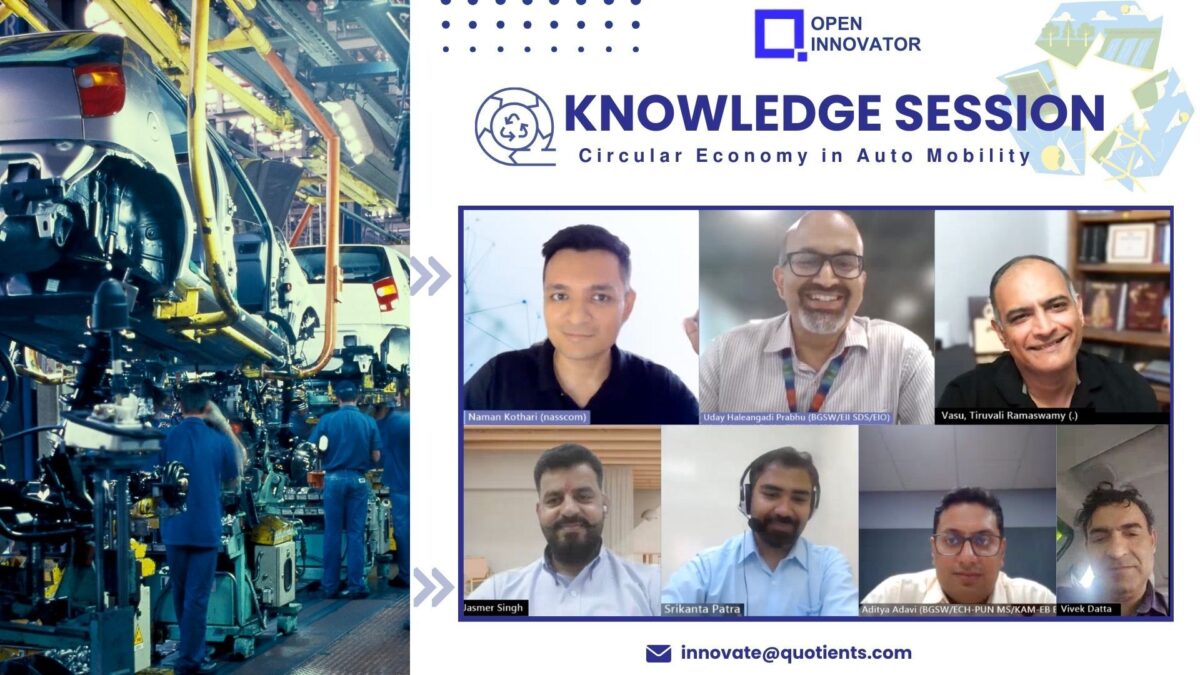The recent Open Innovator session titled “Knowledge Session on Circular Economy in Auto Mobility introduced the concept of the circular economy as a transformative approach to automotive sustainability. The session gathered industry leaders and innovators to discuss how circular economy principles can reshape the automotive sector, focusing on areas like design for serviceability, refurbishment, recycling, and sustainable battery management.
The speakers emphasized the potential of circular economy models to extend the life cycles of vehicles, allowing them to undergo multiple iterations of use rather than ending up in landfills. This shift could lead to a remarkable 70% reduction in material costs, presenting a compelling case for automotive engineers, sustainability experts, policymakers, and investors interested in sustainable mobility.
The session featured insights from prominent speakers, senior directors from Ford Motors, and representatives from Toyota and the NASSCOM Center of Excellence. Sanjeev Malhotra from NASSCOM kicked off the discussion, stressing the importance of sustainability in innovation and inviting input from Bosch representatives on how these discussions are shaping their organizational strategies.
A key focus of the session was the need to transition from traditional linear economic models to more sustainable circular frameworks. Speakers highlighted informal recycling practices in places like Bangalore as examples of how the automotive industry could scale up these efforts into a comprehensive cradle-to-cradle economy. This approach emphasizes not only recycling but also redesigning the value stream of automotive development, promoting resource reuse and minimal waste.
The discussion also delved into the challenges impeding the adoption of circular economy practices in the automotive sector. Financial regulatory pressures and technological limitations emerged as significant barriers, with speakers advocating for enhanced data extraction from manufacturing processes and addressing social, economic, and environmental impacts to facilitate the transition.
Innovative companies were spotlighted for their contributions to the circular economy. Abishek from Batx Energies discussed their role as the largest black mass producer in India, focusing on battery recycling and metal extraction from end-of-life batteries. BETX, another key player, highlighted their recycling capabilities and efforts to refurbish batteries to meet the growing demands of the electric vehicle market.
The session also emphasized the critical role of collaboration in achieving circularity. Representatives from companies like Bosch discussed the importance of creating a predictable ecosystem for electrification, with a focus on battery recycling and data sharing to build trust among manufacturers.
Volkswagen’s commitment to improving their ESD ratings through vehicle life cycle management and Toyota’s focus on sustainable investments in Indian startups further illustrated the industry’s shift toward circular practices. The representatives stressed the need for continuous innovation and collaboration among stakeholders to realize the full potential of circular economy strategies.
In conclusion, the “Knowledge Session on Circular Economy in Auto Mobility” provided a rich platform for exploring the future of automotive sustainability. With a clear emphasis on innovation, collaboration, and addressing the challenges of transitioning to a circular economy, industry leaders expressed optimism about the road ahead. As the automotive sector embraces these principles, it paves the way for a more sustainable and economically viable future in mobility






